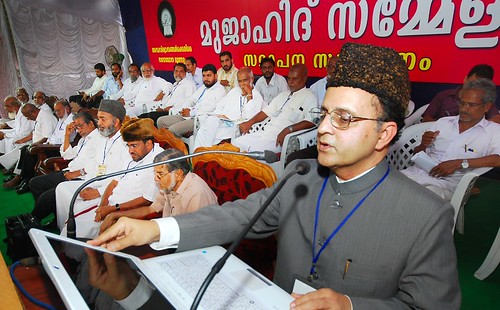By Md. Ali, TwoCircles.net,
New Delhi: Citing many controversial provisions in the Enemy Property (Amendment & Validation) Second Bill, 2010 and thereby the need for more debate and discussions on the issue, civil society organizations working in Muslim community have demanded extension of the last date for accepting suggestions or written memoranda from the public/stakeholders, on the Bill. The Department-Related Parliamentary Standing Committee (Rajya Sabha) On Home Affairs, which is working on the Bill, has invited suggestions by 15th March (tomorrow).
“The Bill has got many controversial proposals of amendment which need more debate and discussion by the civil society,” said Navaid Hamid, Member, National Integration Council (NIC) of India.

Navaid Hamid in Mushawarat office
The Enemy Property Amendment Bill, which deals with the issue of ownership of those properties left by the Indians who migrated to Pakistan, is said will deprive the heirs, almost all of them are Muslims, of their legal right to seek judicial redressal and claim their properties confiscated by the Custodian of Enemy Properties.
After the war with Pakistan in 1965, India declared all such properties left by the migrants “Enemy Property” by passing Enemy Property Act, 1968
“For instance, the Bill in its current form, once passed, will deprive all those genuine Indian Muslims who preferred to live in the country when their close relatives were migrating to Pakistan, of the properties that they inherited from their migrating relatives,” Mr. Hamid argued.

Dr Syed Zafar Mahmood addressing the workshop in Malappuram
“We need more discussion and debate over the issue because frankly people hardly know about it,” said Hamid who is also secretary, Peoples Integration Council.
In fact going a step further he doubted the government’s intention of facilitating a debate on the issue in the first place “as it was only very recently that the civil society got to know about the issue.”
Zafar Mahmood who, though didn’t doubt genuineness of the governments’ intention for a meaningful debate, favored extension of the last date of accepting the suggestions from the stakeholders and the civil society, “how do you expect people to suggest things to you without a meaningful debate, questioned the head of Zakat Foundation of India (ZFI).

L-R: Md Adeeb (MP Rajya Sabha), Md Hamid Ansari (Vice President), Dr Omar Khalidi (Author) & Ataur Rahman Qasmi (Director Shah Waliullah Academy) at the launch of Omar Khalidi’s book in Dec 2009 in Delhi.
Md. Adeeb, Member of Rajya Sabha from Uttar Pradesh, on the other hand, implicitly criticized the lack of awareness among the NGOs working in the Muslim community saying that “you can’t be dependent on the sincerity of Muslim NGOs, who could have solved lots of problems of the community had they been sincere.”
But he talked about political lobbying against the Bill, which he along with several other MPs, has managed to do along with other political parties and MPs, “let the committee close accepting suggestions from the civil society, I am confident because of the talk that I had with Mrs. Gandhi, and Left parties over this issue that this bill is not going to be passed.”
